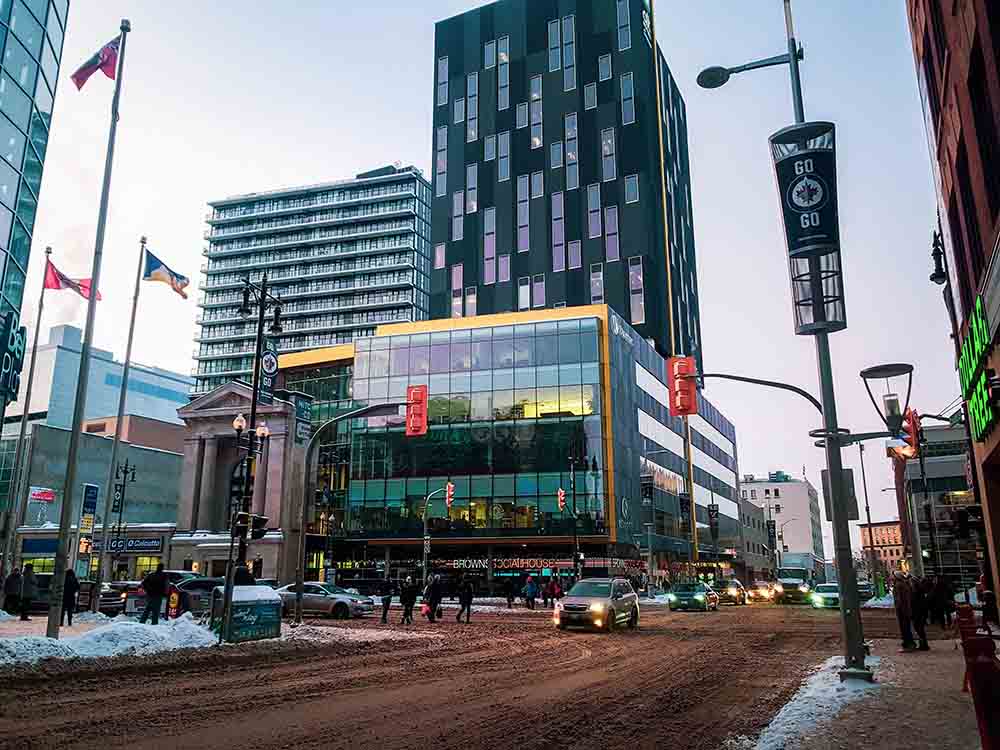In a recent op-ed in the Winnipeg Free Press, associate professor of Criminal Justice at the University of Winnipeg, Kelly Gorkof, an associate professor of Criminal Justice at the University of Winnipeg, argued that the traditional idea of fighting crime is “wrong-headed.” (Fix social conditions, fight crime, Sept.15)
Speaking specifically about downtown Winnipeg, Gorkoff reports: “The province’s solution to these pressing issues … has been to fund more law enforcement and toughen bail conditions.” This was done to make people “feel safe” when visiting downtown Winnipeg.
Gorkoff asks if doing this actually makes downtown Winnipeg less safe for the people who live there:
Although people who work and visit downtown Winnipeg might not feel safe, research actually shows that they aren’t the ones at risk. Visible minorities and the marginalized are more likely to be arrested for crimes and to be the victims of crime. People at risk of crime are those who are houseless, those who have substance dependency concerns, and those who live the effects of colonial trauma. And those folks are the very people who are more likely to come into contact with the Manitoba Government’s increased number of police — not because they violated the law, but because they occupy spaces where they are likely to make others feel unsafe.
If visible minorities and the marginalized are more likely to be arrested for crimes, and to be the victims of crime, does that mean that they are being arrested more often because they are victims of police bigotry or because they are committing more crimes?
The implied systemic racism in the police force only works if the police force is homogeneous. But a review of the evidence shows that it is not homogeneous largely because the Winnipeg Police Services has had a diverse hiring policy for decades.
Of course, by referring to colonial trauma, Gorkoff is referring to Indigenous people. Aside from her insinuation that Indigenous people lack the personal agency to transcend historic adversity, there is a problem with this assumption. Winnipeg has a large Filipino community which initially immigrated from one of the most colonized countries in human history. Yet, we do not see these people committing crimes and being arrested. This happens because they benefited from the opportunity and security proved by our country, even though it has a colonial past.
What Gorkoff is doing by attributing Indigenous crime to colonialism is justifying her low expectations of Indigenous people. When does colonialism cease being a negative causal factor? When does blaming colonialism become a self-serving narrative that is used to rationalize bad life choices?
Gorkoff also attributes crime to poverty: “When we reduce poverty, we have less crime. The wider the poverty gap and the worse the poverty severity index, the higher the deprivation levels among the poor, which lead to more crime.”
Because Gorkoff sees criminal behaviour as a reaction to material inequality, her solution to fixing the problem is to expand the welfare “nanny” state. “All things taken into account, in Manitoba, we are breeding criminality by allowing wage gaps to continue and by not providing a living wage, by a lack of well-funded education, by not supporting parents and communities, by a lack of mental and physical health supports, by a lack of supports for those with substance dependency… and the list goes on. All these things require investment in social programming and community support, not a reduction in these services.”
The fundamental error in Gorkoff’s claim is that she sees the state as the principal social determinant in every person’s life. This implies that personal agency and responsibility are not significant factors in criminal behaviour or raising oneself above poverty. At best Gorkoff reduces the social contract to a business contract: you pay, I behave.
In her argument, inequality causes crime, which becomes a moral imperative for the state to redistribute wealth to reduce that material inequality, so that a person choosing criminal behaviour will not be necessary. An obvious problem with this remedy is that taxing people more and thereby greatly inflating the cost of living makes more people poorer, and, following her logic, they will turn to crime because poverty causes crime.
Not surprisingly, the idea that poverty causes crime has been a chestnut of Canadian socialists for a long time. Gorkoff’s “research on crime prevention and the social determinant of crime has been funded by the Manitoba Research Alliance via a Social Sciences and Humanities Research Council Partnership grant hosted at the Canadian Centre for Policy Alternatives (CCPA).”
The CCPA has been expounding socialist utopianism since its start in 1980 and has been trying to lure adherents by baiting them with class resentment. More recently they have transmuted class resentment into racial resentment as we see with Gorkoff’s suggestion that visible minorities suffer particularly because of a “white” and racist police force.
“When the social conditions of citizens are attended to,” writes Gorkoff, “only then will it make downtown — and the whole of our province — feel safe. At the core of Gorkoff’s social utopianism is a profound cynicism about the human condition and the current state of our society. Moral responsibility is for hire, and we get the civil society we pay for.
But the evidence shows that Canada’s welfare state is among the most generous in the world, yet we see that crime getting worse.
Why?
Because the nanny state infantilizes her citizens. Devaluing and diminishing personal responsibility have led, and will lead in the future, to more crime for two reasons. First, there are fewer personal consequences for committing criminal acts. And second, if material inequality causes crime and the state neglects to correct that inequality, criminal acts cease being criminal and instead become political, the continuation of politics by more violent means.
Michael Melanson is a Winnipeg writer and tradesperson.



